| I started building models because
I was unable to work in my shop because of a broken leg. I found
model building to be fun and informative, so I wrote this article.
My model building experience is limited and I would be the last
to claim to be a master, but I have learned a few things that
I will pass on.
Anyone who plans to build anything can benefit from building
a model first. This applies especially to those building plywood
boats and more especially to first time builders. To be able to
see your boat coming together in three dimensions, to see that
it really works and you can really make it happen can give you
the confidence to go ahead. Building the model will also show
you what parts of the instructions you thought you understood
but didn´t. This doesn´t happen all the time, but
enough to try to avoid it with a $75 sheet of Okume. My reason
for this article is to encourage those of you not overly familiar
with the building process to become familiar using cheap cardboard
rather than expensive plywood, and because it´s so cheap,
you can play around and see what happens if you do this instead
of that. You can also build a model for your mantle or coffee
table if you choose to, but that´s a different thing to
my intention. To use a model to familiarize yourself with the
building process you won´t have to be too careful with accuracy
of measurements as long as they are close, the cuts needn´t
be perfect, but the parts should have a very good right side to
left side symmetry. If you want a table top display model, you´ll
need some very good and accurate measuring tools and sharp cutters.
 |
Tools used |
To build a familiarizing model you will want some heavy cardboard
(I use a product called cascaron that comes in sheets 71cmx111cm
or about 28"x44". Here in Mexico it sells for 14.5 pesos
or about $1.20). Also, a fairly long straightedge, a utility knife,
scissors, scotch tape and maybe hot-melt glue, and a 2H pencil
(softer lead will smear and make a messy looking job). The cascaron
is about twice as heavy as cereal box cardboard and one sheet
will build a model of a 12´boat at a scale of 5-1. I like
5-1 because it´s big enough to see what you have and small
enough to be comfortable at the kitchen table. A 12´boat
will make a model about 30" long. You may want to change
the scale for larger and smaller boats. Nothing here is written
in stone, we´re supposed to be having fun, eh.
 |
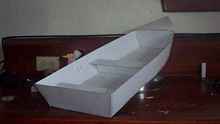 |
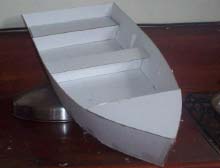 |
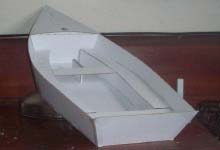 |
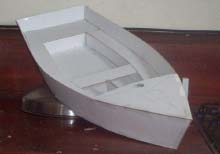 |
 |
O.K., let´s build a model. First, read your plans and building
instructions TWICE or more, until you are familiar with them,
then cut out the parts. There are two types of building that I
will deal with here, one being the "Instant Boat" type
and the other being the multichine type built over frames on a
strongback. For the "Instant Boat" type, and this will
apply to many of Jim Michalaks designs, we start by scotch taping
the stem, then scotch taping the transom to the sides. Put in
your bulkheads and any temporary molds. your boat will now have
rocker to the bottom. If you plan to take the bottom lines from
the hull, mark a centerline and mark the centers of all the bulkheads
and line these marks up as you roll the hull over the cardboard
bottom piece. I use the scissors to cut curves. Attach the bottom
and any inside pieces, i.e. seats, and you have a model of your
boat.
 |
 |
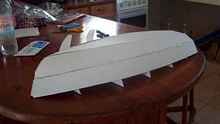 |
 |
 |
The multichine will probably need a mold made of a strongback
and frames across it. You can see how I built mine in the accompanying
photo. Once you have that, mark the panels against the molds and
cut out, or cut to the dimensions given in the instructions, then
glue them up and you have a hull. I cut all my panels full length
from the cardboard. I don´t think practicing plywood butt
joints with cardboard serves any purpose or has much value. Some
things just have to wait till you get to the plywood.
So, guys and gals, this is easy, it´s fun, it´s
cheap enough that you can build any number of models as confidence
builds or just to have fun or to experiment, and if you don´t
already know everything, you might even learn something. Have
a go at it!
The above was written after I had built the models shown. Two
were of the "Instant Boat" type, built without a building
jig, and very easy to build. The multichine needed a building
jig, in its case fairly simple. I had just bought Renn Tolmans
book "The
Tolman Alaska Skiff" and decided to build a
model of it photographing the process. The building method for
the Tolman skiff is not what you would normally encounter, but
all the better, because this part of the article will deal with
building jigs for models and building my skiff model taught me
some things, it did!
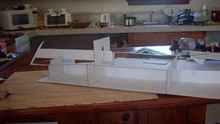 |
 |
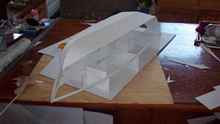 |
 |
 |
 |
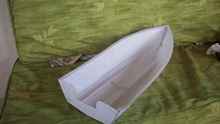 |
 |
First of all, building jigs are designed by the designer to real
size, which for a model might wind up too close to the floor,
which, in a model, is the cardboard base that the jig is glued
to to keep right angles right angles. You will have to decide
if you want the whole thing elevated some to give you room to
work. Depending on the boat, you may not have to, but still may
want to. Second, and this I learned building the skiff, if you
are going to mark the cuts on panel from a partially built model,
the jig must not move. Cardboard is not very strong, so may have
to be made in the form of an I-Beam, or possibly use another material
(plywood, metal bar) for some parts of the jig. I realized after
building my skiff, that I could have used printer paper to make
patterns of the side panels as it bends much easier than cardboard.
The message here is that you will have to re-design the building
jig to some degree, and how much re-designing will depend on the
boat.
Another thing to consider is that if you have a lot of trouble
figuring out how to modify the jig to build the model you may
have bitten off a bigger piece than you can handle at this point
in your building career. If you need a complicated jig, you probably
have chosen a complicated boat to build. Build something simple
first. Bolgers "Instant Boats" and Jim
Michalaks boats are very simple. Michael
Storers Oz PDR is an easy build with 60 some odd
pages of instructions. Michalak and Storer also teach you how
to build a polytarp sail, which Bolger (Payson) doesn´t.
____________________________________________________________

***** |



